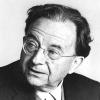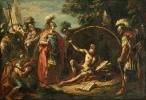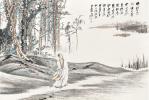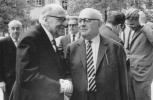The Ultimate Guide to the Philosophy of Erich Fromm
Biography, ideas, books
Contents:
Who was Erich Fromm?
Erich Fromm (1900-1980) was a German social psychologist and philosopher who criticised modern capitalist society on the basis of Marxist and Freudian arguments. He is known for his books discussing how to create better societies and his analysis of love.
As a psychologist, he based his theories on Sigmund Freud’s psychoanalysis. He was also influenced by the ideals of Marxism, although he was critical of the existing Soviet Union style of socialism.

He began life as a Jew and was forced to leave Nazi Germany in 1934 and relocate to Switzerland, and later to the US and Mexico. In later years, he was critical of religious institutions, which he saw as a source of divisions among humans.
Read more about Erich Fromm’s life and work here:

Erich Fromm (1900-1980) was a German social psychologist and philosopher who had enormous popular success from the 1950s all the way to the end of his life in 1980. We discuss his work and his relation to Marxism and Freud.
The Happier Society. Erich Fromm and the Frankfurt School.
In this book, philosophy professor, popular author and editor of the Daily Philosophy web magazine, Dr Andreas Matthias takes the reader on a tour, looking at how society influences our happiness. Following Erich Fromm, the Frankfurt School, Aldous Huxley and other thinkers, we go in search of wisdom and guidance on how we can live better, happier and more satisfying lives today.
This is an edited and expanded version of the articles published on tis site.
Get it now! Click here!

Erich Fromm on the psychology of capitalism
One of the main themes of Erich Fromm’s work was the psychological analysis of capitalist society. Like Freud had analysed the individual, Fromm aimed to analyse whole societies and economic systems.
In his works “To Have Or To Be” and “The Escape From Freedom,” Erich Fromm diagnoses the profound unhappiness of Western modern men as the result of a flawed economic system. Capitalism, he believes, forces us to emphasise the possession of material goods (the “having” of things) and to neglect the qualities of our characters (our “being” as persons).
Read more about “To Have Or To Be”:

Erich Fromm distinguishes between two modes of existence. One can live one’s life in the “mode of having” or in the “mode of being”.
Erich Fromm is not alone in his critique of capitalism. From Diogenes and Epicurus to modern minimalism activists, from ancient times to the present, there is a long tradition of philosophers suggesting that long-lasting happiness might be easier to achieve if we don’t primarily focus on material gains. Read more about the question how much money we really need right here:

From Diogenes and Epicurus to Erich Fromm there is a long tradition suggesting that we might be happier with fewer material goods.
In one of his most wide-read works, “The Escape From Freedom,” Erich Fromm makes the point that freedom, which we are used to seeing as a positive thing, actually can be perceived as threatening. In medieval societies, for example, one’s public behaviour and choices were prescribed to great detail and this, although it took away people’s freedoms, gave them the assurance of having a safe and well-defined place within society.
Modern society has taken away these assurances. The freedom we have in choosing our jobs, friends, partners and lifestyles also means that every choice we have to make is accompanied by insecurity and anxiety. Read on here for a more detailed review of Fromm’s analysis of the darker side of human freedom:

Erich Fromm claims that freedom itself can sometimes be the cause of fear and anxiety, forcing us to find ways to “escape from freedom.” Authoritarianism, destructiveness and automaton conformity are three ways how we try to cope with the freedom we fear.
And finally, here is a short piece that summarises and applies Erich Fromm’s ideas to modern capitalist societies. Capitalism, in order to work, requires a large population of identical consumers with identical taste. This is opposed to the vision of a human life as individual, unique, and valuable in its uniqueness. Read more here:

Erich Fromm points out that capitalism, in order to work, requires a large population of identical consumers with identical taste.
Erich Fromm on technology and progress
An important part of Erich Fromm’s critique of capitalism is his analysis of technological progress.
Technology, so Fromm, has developed in the West to support capitalist structures of work and production. It is therefore designed to serve those who control the capital and the means of production, and it is opposed to the happiness of society as a whole. The promises that technology has made since the start of the Industrial Revolution have not been fulfilled. According to Fromm, we are now less happy and less satisfied with our lives than we would be without modern technology. Read more about Fromm’s views on technological progress here:

According to philosopher Erich Fromm, the dream of endless technological development has led to a depletion of natural resources and the destruction of nature.
But we don’t need to stop at the level of states and societies. Even if look at our personal lives, we can often see the detrimental effect of technologies that make us dependent on gadgets without promoting our well-being. Fromm advocates a more judicious use of technologies in our everyday lives. Read more about our own, personal relation to technology here:

According to Erich Fromm, modern technology is to be blamed for constant surveillance, destruction of the planet, and widespread AI-caused unemployment.

Erich Fromm and the problem of happiness
Independently of Erich Fromm’s more political works, he was also very influential in his analyses of personal happiness and love. In multiple books, he contrasted the “western” with the “eastern” way of perceiving the world. This is probably over-idealising the “eastern” approach, but it still provides a thrilling analysis of how we could gain more happiness in our own lives by trying to see the world in a different way.

Is there a difference between the way we perceive happiness and life in the West in comparison with “Eastern” cultures? We compare Erich Fromm and Lin Yutang.
In our working lives, we are always kept busy and therefore, seemingly, productive. But Erich Fromm thinks that we must clearly distinguish what he called mere “busyness” (in the sense of being kept busy through meaningless activity) from real productivity. Someone day-dreaming, for example, might be truly productive if this day-dreaming is important for their psychological development or their life satisfaction; while someone endlessly busy shifting papers across a desk might be unhappy despite their superficially high levels of activity. Read more here:

For Erich Fromm, true activity means to fully use one’s talents in order to grow as a person. The mere display of business is not a sign of productive work.
Our privates lives in capitalist societies suffer from clutter in all its forms, which is just another obstacle that prevents us from being truly happy and at peace. If we want to declutter, we must, according to Erich Fromm, first change our relationship to the world. We must change who we are and how we relate to our families, to our friends, to our possessions. Read about it here:

If we want to declutter, we must, according to Erich Fromm, first change our relationship to the world.

Erich Fromm and the philosophy of love
As a psychoanalyst in the tradition of Sigmund Freund, love was a topic of central interest to Erich Fromm. One of his best-loved books is “The Art of Loving,” which contrasts the myths about love that are often being believed today (and promoted by Hollywood movies and pop culture) with the psychological reality of love. If we want to be happy, we need to understand love. And to understand love, we need to read Erich Fromm’s analysis of it. Here is more on the topic:

In his book “The Art of Loving,” psychoanalyst and philosopher Erich Fromm discusses how love is misunderstood in modern societies.
But it’s not enough to discuss love as a theoretical exercise. As opposed to his sweeping criticism of capitalism, in the realm of love every single one of us can (and must) act for themselves. So how can we become truly happy, loving persons? Here is Erich Fromm’s recipe for a happier love life:

Philosopher and psychologist Erich Fromm believes that the main source of pain and anxiety for human beings comes from the feeling of separateness from others.

Erich Fromm’s new society
Erich Fromm has not only criticised society, but also presented his own utopian vision of an ideal world. Based on the criticism of society put forward by the Frankfurt School of thinkers, he develops his own concept of a new society. Read a short introduction to the Frankfurt School here:

The Frankfurt School is generally taken to mean a lose collection of thinkers who first congregated around the Institute for Social Research in Frankfurt am Main, Germany.
The Frankfurt School, in turn, was heavily influenced by Karl Marx and his thought. Many ideas in Marx’s work seem a bit dated nowadays, particularly because our modern, service-oriented, IT-based societies work differently in many respects from the industrial revolution factories of Marx’s own times. But one Marxist concept that has retained its fascination is the idea of “alienation.” Both the Frankfurt School and Fromm would argue that this alienation has even increased in modern times, to the extent where it successfully prevents us from taking control of our own lives and happiness. Read all about it here:

One of his best known concepts of Marxism is the idea of “alienation” that describes how human beings get estranged from their work.
Erich Fromm developed his own ideas about the “New Society.” In multiple books, he explains what we have to change in order to create a society that will be more conducive to human happiness and flourishing. Find all of Fromm’s ideas about the new society explained here:

Philosopher and social psychologist Erich Fromm analysed the problems of Western, capitalist societies. We look at his ideas for the perfect society.
And, finally, if we look at Erich Fromm’s ideal society in a historical context, we find that the British writer Aldous Huxley had, at around the same time, developed similar ideas. In his book “Island,” Aldous Huxley takes us on a tour of a fictional “island” that represents his ideal society. It is interesting to compare these two conceptions with each other. We can then see where these two great thinkers of the 20th century, Erich Fromm and Aldous Huxley, agreed in their criticism of society and where they differ. Read about Aldous Huxley’s ideal society here:

The last book of visionary writer Aldous Huxley (1894-1963), Island, is a bold attempt to envision a utopian society that provides its members with everything they need to achieve happiness in life.
Erich Fromm’s major works
Erich Fromm was a very prolific writer. He wrote in both German and English, but I’ll list here only his most important English works. Follow the links below to buy the most important books that are discussed in this guide.
Please note that these are links to Kindle books, but you can switch the kind of book you want to buy with one click on the Amazon site.
Daily Philosophy’s top picks
Erich Fromm: To Have Or To Be?
In this book, Fromm discusses two different ways of behaving and living one’s life: the way of having and the way of being.
Amazon affiliate link. If you buy through this link, Daily Philosophy will get a small commission at no cost to you. Thanks!
Erich Fromm: The Art of Loving.
One of Fromm’s most influential books. What is love all about and how to achieve success in love? The book that changed how we look at love forever.
Amazon affiliate link. If you buy through this link, Daily Philosophy will get a small commission at no cost to you. Thanks!
Erich Fromm: The Anatomy of Human Destructiveness.
Similar in scope to To Have or To Be, but more focused on the psychoanalytical basis in Fromm’s analysis of what is wrong with modern society.
Amazon affiliate link. If you buy through this link, Daily Philosophy will get a small commission at no cost to you. Thanks!
Erich Fromm: Escape from Freedom.
The book that diagnoses the anxiety at the centre of modern Western society.
Amazon affiliate link. If you buy through this link, Daily Philosophy will get a small commission at no cost to you. Thanks!
Chronological bibliography of selected works
- Escape from Freedom (1941)
- Man for himself, an inquiry into the psychology of ethics (1947)
- Psychoanalysis and Religion (1950)
- The Sane Society (1955)
- The Art of Loving (1956)
- Zen Buddhism and Psychoanalysis (1960)
- Marx’s Concept of Man (1961)
- Socialist Humanism (1965)
- You Shall Be as Gods: a radical interpretation of the Old Testament and its tradition (1966)
- The Revolution of Hope, toward a humanized technology (1968)
- The Anatomy of Human Destructiveness (1973)
- To Have or to Be? (1976)
The Happier Society. Erich Fromm and the Frankfurt School.
In this book, philosophy professor, popular author and editor of the Daily Philosophy web magazine, Dr Andreas Matthias takes the reader on a tour, looking at how society influences our happiness. Following Erich Fromm, the Frankfurt School, Aldous Huxley and other thinkers, we go in search of wisdom and guidance on how we can live better, happier and more satisfying lives today.
This is an edited and expanded version of the articles published on tis site.
Get it now! Click here!

◊ ◊ ◊
Title image by Müller-May / Rainer Funk, CC BY-SA 3.0 de, https://commons.wikimedia.org/w/index.php?curid=43921778









